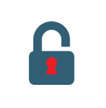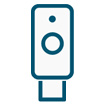
90% of all internet breaches are due to stolen login credentials. Are you and your organisation secure against phishing attacks?
Rise in cyber crime since the pandemic began (FBI).
Of companies in Europe & the Middle East have been victims of cyber attacks (Thales).
Cyber attacks begin with a phishing email (Deloitte).
Phishing is the fraudulent practice of inducing people to reveal sensitive personal information such as credit card numbers and login credentials passwords.
In a typical phishing attack…

Target receives email seemingly from a real person or reputable business

The design and URL of the fake website will seem identical to genuine site

Hackers can now commit fraud or blackmail the user into paying a ransom
Once hackers have successfully logged in, there are many ways they can damage your organisation. Company secrets and private data can be leaked, or even sold online. Hackers can use this data, or the threat of paralysing crucial business systems, to demand costly ransoms. They may even stay undetected for months or years, slowly gathering sensitive information.
Suffering a hack can severely impact an organisation’s bottom line. In 2022, the cost of an average data breach rose to a record-breaking $4.35 million (IBM).
Yubico’s State of Global Enterprise Authentication survey found that of companies who were victims of a cyber attack…
The good news is, phishing can be stopped. All it takes is Multi-Factor Authentication (MFA). The most common forms of MFA use mobile authentication, such as One-Time-Password apps or SMS codes. However, research by Google, NYU, and UCSD based on 350,000 real-world hijacking attempts proved that these are not very effective in preventing account takeovers and targeted attacks.
The problem is that mobile authentication itself is vulnerable to phishing attacks.

True protection requires phishing-resistant MFA, such as a hardware security key. The YubiKey is proven to stop over 99% of account takeovers.